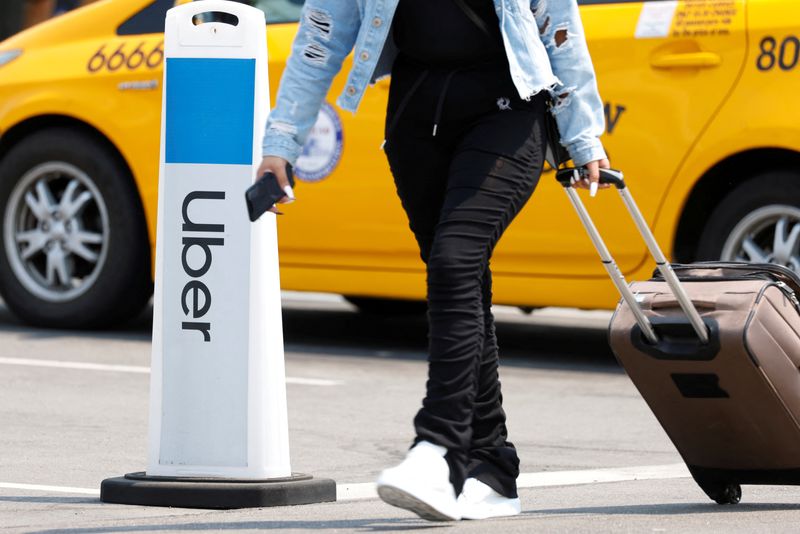Legal challenges could hamper U.S. rule to limit independent contracting
2022.10.12 06:42
[ad_1]

© Reuters. FILE PHOTO: A traveler arriving at Los Angeles International Airport looks for ground transportation in Los Angeles, California, U.S., August 20, 2020. REUTERS/Mike Blake/File Photo
By Daniel Wiessner
(Reuters) – Business groups will almost certainly file lawsuits in an attempt to delay or derail a rule proposed by the Biden administration on Tuesday that would limit companies’ use of independent contractors, experts said.
The proposal by the U.S. Department of Labor prompted immediate criticism from groups representing an array of industries and caused stocks of companies that rely on gig workers, such as Uber (NYSE:) and Lyft (NASDAQ:), to tumble because of expectations that it will sharply raise their labor costs.
Business groups will lobby for changes to the proposal before it is finalized in the coming months but ultimately will likely have to make their case in court that the rule is invalid, legal experts said.
“There’s going to be years of litigation over this,” said Michael Lotito, a San Francisco-based lawyer who represents employers and business groups. “This has Supreme Court written all over it.”
The proposal says when workers are “economically dependent” on a company, they should be classified as employees entitled to the minimum wage, overtime pay and other legal protections, and not independent contractors.
The current rule on worker classification, which was adopted during the Trump administration and is favored by business groups, says workers who operate their own businesses and are free to work for multiple companies can be considered contractors. Under that standard, far more workers can qualify as contractors, which studies estimate can cost companies about 30% less than employees.
The department’s sharp break from the Trump-era standard will likely be the focus of lawsuits challenging the new rule, which is expected to be finalized next year, according to legal experts. Federal law requires agencies to adequately explain their decision to withdraw and replace existing rules.
In a call with reporters on Tuesday, Solicitor of Labor Seema Nanda said the Trump-era rule was out of step with the standards applied by federal courts for decades and has increased the risk of worker misclassification.
Nanda said the new proposal makes clear that workers are independent contractors only when they are truly in business for themselves rather than relying on a company for work.
But Lotito and others said the department’s decision to completely scrap the Trump administration rule, rather than identify specific problems with it and aim to fix them, could make a new regulation vulnerable to legal challenges.
Any lawsuit would likely seek to block the rule from taking effect while challenges make their way through appeals courts, which could take years.
Businesses and trade groups are also likely to attack the substance of the new rule once it is finalized, arguing that the way it defines employment is inconsistent with federal wage law and creates uncertainty around the legal status of many workers, said Roger King, a veteran labor lawyer and senior counsel at the HR Policy Association, a business group.
Individual businesses, workers and trade groups could also bring narrower legal challenges to the new rule. Those lawsuits could argue that the rule cannot be applied to industries with their own set of regulations, such as trucking, or that it violates the constitutional rights of specific companies by targeting their industry.
A strict worker classification test adopted by California in 2019 was met with separate challenges by gig economy firms, the trucking industry and groups representing freelance writers and photographers. So far, those challenges have failed.
[ad_2]
Source link








